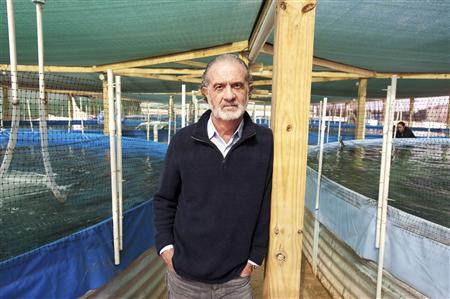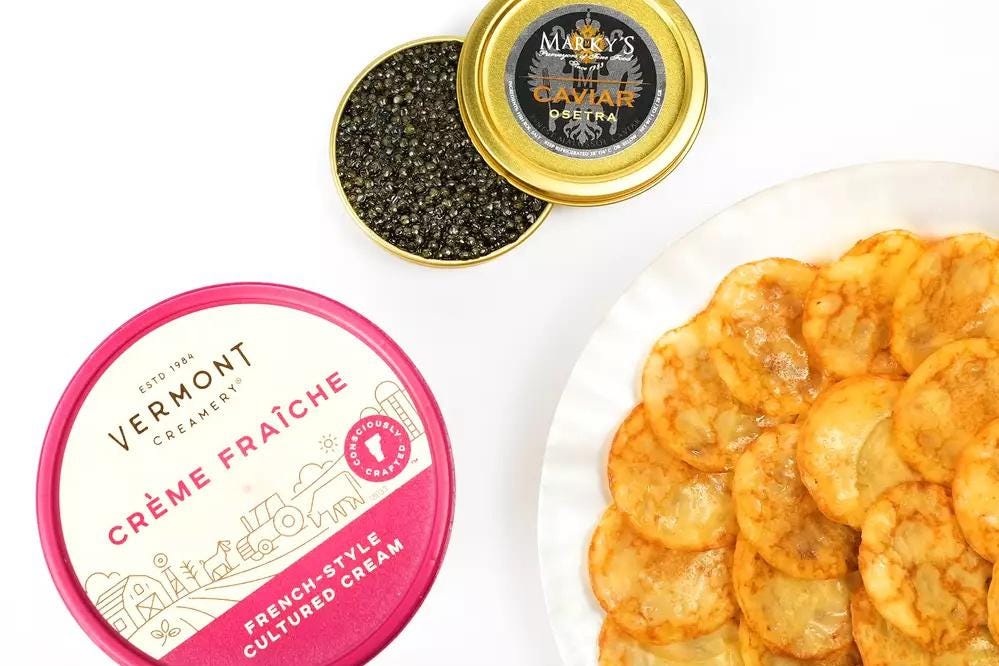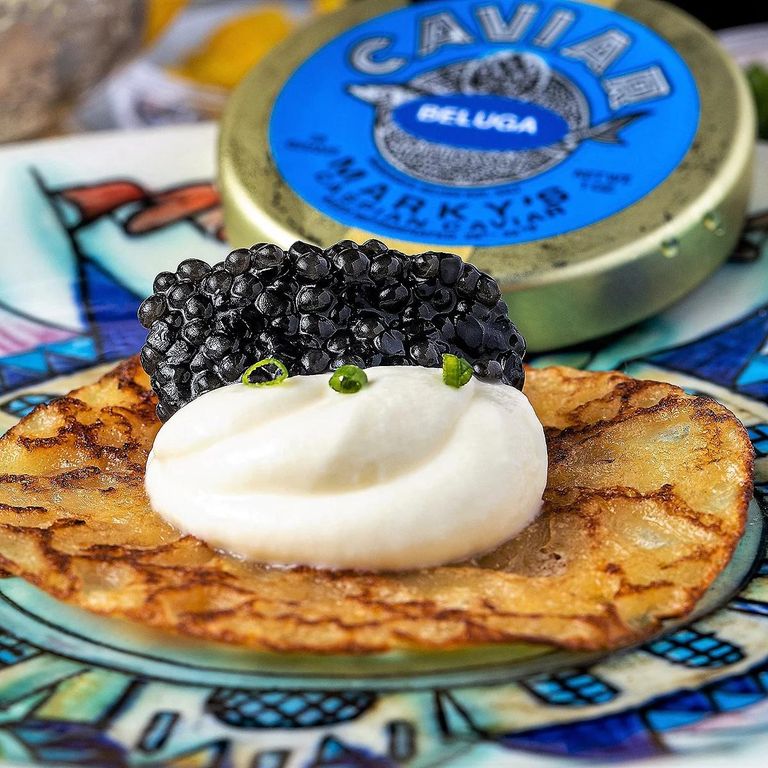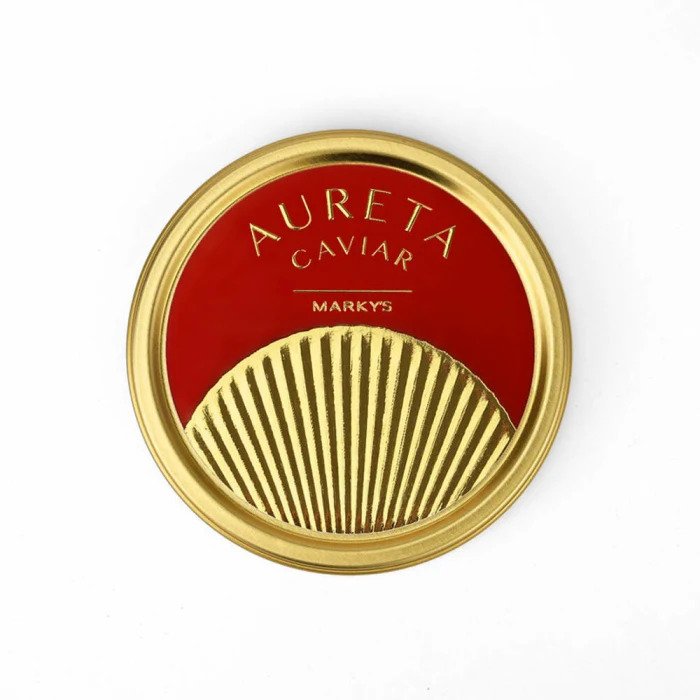Ukrainian emigre aims to be America's beluga caviar king
www.reuters.com
By Tom Brown
Published: Wed Mar 6, 2013
Mark Zaslavsky, chairman, chief executive and owner of the Miami-based specialty food import, export and distribution business Marky's, poses at Sturgeon Aquafarms in Bascom, Florida February 8, 2013.
REUTERS/Michael Spooneybarger

BASCOM, Florida (Reuters) - A decade after he began his quest to produce beluga caviar in America, Mark Zaslavsky coos with pleasure as he surveys the fish swimming in row after row of large galvanized steel tanks on his aquafarm in this tiny town in the northwest Florida Panhandle.
"Look at this fish. Look at how beautiful it is," Zaslavsky said, as a large beluga sturgeon, bony-plated and with a long snout, poked its head above the waterline.
"We hope that in two or three years we will be producing a lot of beluga caviar, good quality beluga caviar," the Ukrainian emigre said.
Zaslavsky, 60, owns a successful Miami-based specialty food import, export and distribution business called Marky's. His obsession, however, is with beluga caviar - a delicacy now banned in the United States due to environmental restrictions.
If an application he submitted to the Fish and Wildlife Service on December 4 wins approval, he will be well on his way to becoming the first person in the United States to build a business around the domestic production of beluga sturgeon.
Connoisseurs have long considered the roe of the primordial beluga to be the best caviar anywhere, and Zaslavsky could be crowned as an undisputed 'caviar king' by cornering the market for the pricey eggs.
Zaslavsky, who fled his communist-ruled homeland in 1980, came to Miami with only about $50 in his pocket and worked as a dishwasher and short-order cook, among other odd jobs, before scraping together enough money to open a small deli-grocery.
He co-founded Marky's with his partner, Mark Gelman, in 1985 and it has grown into a gourmet foods business with annual revenues that Zaslavsky estimates at about $20 million. One of the leading caviar merchants in the United States, offering a wide range of domestic and foreign varieties, Marky's boasts about 2,000 customers. Its clients include some of New York's best Russian restaurants, such as Brasserie Pushkin and Onegin.
All sales and imports of beluga caviar have been prohibited since 2005 when federal regulators, bowing to years of pressure from environmental groups, recognized that wild beluga sturgeon had been brought to the brink of extinction by overfishing, pollution and loss of habitat in the Caspian Sea.
Zaslavsky can potentially skirt the ban because he began importing live beluga and other Caspian sturgeon and raising them in Florida in June 2003. He completed the last of 14 separate shipments of his beluga, which came from fertilized wild beluga eggs spawned on a farm in Fulda, Germany, in July 2004, months before the U.S. clampdown on imports took effect.
Zaslavsky says he successfully spawned beluga from his original broodstock for the first time in 2010 and then twice again in 2011. He now has more than 28,000 beluga, along with about 40,000 sevruga. He plans to start ramping up commercial caviar production over the next year or two, beginning with the sevruga, a Caspian variety that is not currently covered by the U.S. Endangered Species Act.
FORBIDDEN FRUIT
Zaslavsky said he and Gelman had invested about $4.5 million so far in their new business called Sturgeon Aquafarms and were working with a group of investors to raise more money for the venture. He estimates his domestic beluga could yield between $5 million and $10 million in annual revenues.
Other U.S.-based sturgeon aquafarms have been producing caviar since the 1990s, and California accounts for 70 to 80 percent of U.S. domestic caviar production - but they do not produce the coveted beluga variety.
"They're definitely going to be in a potentially good spot to be able to exploit the marketplace," said Jim Michaels, director of the sturgeon aquaculture program at Mote Marine Laboratory in Sarasota, Florida.
Michaels and other experts said they believed beluga sturgeon were being farm-raised in several locations in Europe but Zaslavsky said he was only aware of a few small-scale operations in Bulgaria, Romania and his native Ukraine.
"It takes a while to grow fish," said Zaslavsky, as he spoke to Reuters on a recent tour of the Bascom facility. "It's far from being easy. It's very difficult."
Sturgeon have to reach sexual maturity before they can produce roe. In the wild, that can take 15 to 20 years. But in captivity, with the right water temperatures and a specially formulated high-protein diet, it can happen in as little as six or seven years.
Mats Engstrom, co-founder of San Francisco-based Tsar Nicoulai Caviar and a pioneer of the domestic caviar industry, thinks Zaslavsky might be on the right track and offers words of encouragement.
"You have to give him credit for staying with it," Engstrom said of his younger rival. "I think he has something, but it takes a lot of money and perseverance."
Engstrom started out making caviar from American white sturgeon in the 1970s and still sings the praises of the fish, which produces a roe comparable in taste to Caspian osetra.
But Engstrom also knows a thing or two about the guilty pleasures of beluga caviar. Speaking in a recent phone interview, he recalled gorging on more than 3 pounds (1.5 kg) of the stuff in one sitting back in the 1990s.
The briny black eggs were given to him by the president of Kazakhstan, as a gift at the end of a business trip to the former Soviet Republic. Engstrom washed them down with champagne on the long plane trip home to California, including a stopover in Zurich, to avoid the penalties he would have faced due to curbs on imports under an international treaty in place at the time.
Apart from Sturgeon Aquafarms, which Zaslavsky founded in 2001, the only other farm raising beluga in the United States is Evans Farms in the central Florida town of Pierson. Those fish are being raised to maturity under a contractual agreement with Sturgeon Aquafarms from its broodstock, Zaslavsky said.
MILLION DOLLAR FINE
For Zaslavsky to qualify for a so-called "special rule" exemption to the Endangered Species Act, and be authorized to sell beluga caviar and meat on the U.S. market, he will need to show that there is some sort of "benefit to the species in the wild," according to Pamela Scruggs, branch chief for the Division of Scientific Authority at the U.S. Fish and Wildlife Service.
"That's not an easy bar to meet," she said.
Zaslavsky said he had already laid the groundwork for approval, however, with agreements in place with "scientific and administrative authorities" in Russia and Azerbaijan to work toward the recovery of wild beluga sturgeon.
He is obviously jittery about his request for "special rule" approval nonetheless, given how much he has already invested in his high-cost and slow-moving venture.
Marky's, which has also done business as Optimus Inc, pleaded guilty in federal court in Miami in 2004 to purchasing illegally-obtained caviar from smugglers and was hit with a $1 million fine. Zaslavsky says the company successfully completed probation, however, and now boasts a model compliance program to ensure proper and transparent purchasing.
Tens of thousands of sturgeon, from baby fry to mid-size and large bony-plated fish, including osetra and sterlet, swim along with beluga and sevruga in the metal tanks - lined with a special type of vinyl used for the storage of potable water - on Zaslavsky's farm, which is bordered by cotton farms in a bucolic rural area.
Though he is targeting the high-end of the U.S. gourmet food market there is nothing - apart from the exotic fish themselves - luxurious about the farm. Large bags of salt and fish meal, with a specially formulated mix of fat and protein, were stacked like cordwood alongside scores of 21,000-gallon water tanks at the facility, nestled under rooftops to shield them from the harsh Florida sun. Water pumps hummed as they raised and circulated water from a well drilled into a low-lying aquifer.
The largest of Zaslavsky's sturgeon weighs about 250 pounds (113 kg). They can grow far larger, and have been known to live to more than 100 years old in the wild. Only about 45 of the 76 original beluga sturgeon, brought across as young fish from Germany, still survive.
It remains to be seen how consumers might take to the idea of beluga caviar from a Florida backwater, as opposed to the 'real' thing from traditional sources.
But if the Florida-made caviar tastes good and is priced right, there should be no shortage of chefs who would like to serve it, experts say.
"If it's environmentally friendly and it's raised in humane ways, all that sort of stuff, I'm sure there would be a huge market for it," said Mitchell Davis, executive vice president of the James Beard Foundation in New York, a non-profit group that monitors new developments and trends in American gastronomy.
"The success of all sorts of other caviars would lead me to believe that, yeah, people would love to have a domestic beluga caviar," he said.
Zaslavsky would not go into detail about future pricing for his beluga caviar. But he said French websites advertised beluga caviar online in France for up to $17,000 a kilo.
"We'll make it 10 times cheaper. We'll make it affordable to anybody who wants to try beluga," he said.
"It will no longer be Iran and Russia dominating on the world market with the finest caviar. It will be Bascom, Florida," Zaslavsky said.
(Reporting by Tom Brown; Editing by Claudia Parsons and Leslie Gevirtz)
http://www.reuters.com/article/us-usa-florida-caviar-idUSBRE9251E720130306






